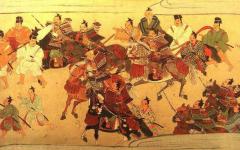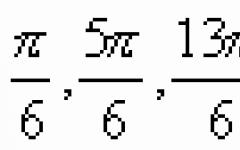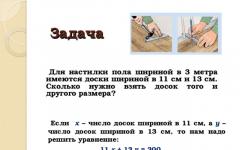Currently, it is customary to call any abbreviated word or phrase.
The following are distinguished: types of abbreviations:
- initial type abbreviations(formed from the initial letters of each word as part of the phrase: Unified State Examination - single state exam; ACS - automated system management);
- syllabic abbreviations(formed from a combination of the initial parts of words, for example: state farm, collective farm);
- mixed abbreviations, consisting of both the initial parts of words and the initial sounds: social security, KamAZ;
- abbreviations consisting of a combination of the initial part of a word with the whole word: spare parts, savings bank, organizational work;
- abbreviations consisting of a combination of the initial part of a word with the oblique case form of a noun: head of department, platoon commander, department manager;
- abbreviations consisting of a combination of the beginning of the first word with the beginning and end of the second or only the ends of the second: moped (motorcycle-bicycle), destroyer (destroyer);
- graphic abbreviations(i.e. - that is, since - since).
Recording abbreviations
According to the current spelling rules of the Russian language, all abbreviations read by letter names, for example: RF (Russian Federation), Ministry of Internal Affairs (Ministry of Internal Affairs), Central Committee ( Central Committee) etc., .
All abbreviations readable by sounds, denoting names of institutions or organizations in which at least the first word is written with a capital letter, for example: MFA (Ministry of Foreign Affairs), UN (United Nations), also written in capital letters.
Abbreviations read by sounds (and not by letter names) and denoting common nouns(for example, university, rono, bunker), are written in lowercase letters.
Features of the pronunciation of some abbreviations
Abbreviations containing the sound [f] have interesting features: Germany and FSB. Initially, the abbreviation of the Federal Republic of Germany was pronounced as a letter (that is, read by the names of the letters: [ef-er-ge]). But since the letter F is in colloquial speech pronounced [fe], which is explained by economy speech means, in particular by articulation laws (and our “linguistic laziness”, as K.S. Gorbachevich believes), today the pronunciation of Germany is recorded as [fe-er-ge] - a letter-sound abbreviation, as well as the FSB [fe-es-be ] and [ef-es-be].
The abbreviation USA is traditionally assigned the pronunciation [se-she-a], i.e. it is a special abbreviation: it is read by letters, but not as is customary in literary language, but as the letters S [es] and Ш [sha] are called in colloquial speech.
How to decline abbreviations
In modern Russian, all initial (consisting of the first letters of words) abbreviations ending in a vowel are not declined, for example: MGU, OAO. Sound abbreviations are usually declined with reference word masculine: Moscow Art Theater, State Bolshoi Theater, GOST.
Indeclinable abbreviations include:
- initial abbreviations of a letter nature: CIS, GUVD, FSB, etc.;
- abbreviations with a reference word of the neuter and feminine gender: TASS, MAPRYAL, AZS, GES (but MFA - it is permissible to decline and not to decline);
- borrowed abbreviations ending in a hard consonant (for example, MAN - automobile company);
- words such as head of department, Ministry of Defense, Ministry of Education and Science, deputy minister, deputy director, warehouse manager, etc.
In addition, abbreviations of a sound nature with a masculine reference word are often not declined in written and official business speech.
Sources and additional information:
- orthowiki.kalan.cc - letter abbreviations and compound words (Russian spelling rules 1956);
- gramota.ru - what are the abbreviations?
Abbreviation V current time It is customary to name any abbreviated word or phrase.
There are subsequent types of abbreviations:
Recording abbreviations
According to the current spelling rules of the Russian language, all abbreviations read by letter titles, for example: RF (Russian Federation), Ministry of Internal Affairs (Ministry of Internal Affairs), Central Committee (Central Committee), etc., .
All abbreviations readable by sounds, denoting the names of institutions or organizations in which at least the first word is written with a lowercase letter, for example: Ministry of Foreign Affairs (Ministry of Foreign Affairs), UN (United Nations), also written in capital letters.
Abbreviations read by sounds (and not by letter titles) and denoting common nouns(for example, university, rono, bunker), are written in lowercase letters.
Features of the pronunciation of certain abbreviations
Abbreviations that contain the sound [f] have noteworthy features: Germany and FSB. At first, the abbreviation of the Federal Republic of Germany was pronounced as a letter (in other words, it was read by the names of the letters: [ef-er-ge]). However, because the letter F in colloquial speech is pronounced as [fe], which is explained by the economy of speech means, namely articulation laws (and our “linguistic laziness,” according to K.S. Gorbachevich), the pronunciation of Germany is now recorded as [fe- er-ge] - letter-sound abbreviation, also FSB [fe-es-be] and [ef-es-be].
The abbreviation USA is traditionally assigned the pronunciation [se-she-a], i.e. it is a special abbreviation: it is read by letters, but not as is customary in a literary language, but as the letters S [es] and Sh [sha] are called in colloquial speech.
How to decline abbreviations
In modern Russian language All initial (consisting of the first letters of words) abbreviations ending in a vowel are not declined, for example: Moscow State University, OAO. Typically, sound abbreviations with a masculine reference word are declined: MKhAT, GABT, GOST.
Indeclinable abbreviations include:
Apart from this, sound abbreviations with a masculine reference word are often not declined in written and official business speech.
Additionally on the site:
What abbreviations are declined in the Russian language?
Currently, it is customary to refer to any abbreviated word or phrase as an abbreviation. The following types of abbreviations are distinguished: abbreviations of the initial class (formed from the initial letters of each word as part of the phrase: Unified State Examination - unified municipal exam; ACS - automated control system); syllabic abbreviations (formed from a combination of the original parts of words, for example: state farm, collective farm); mixed class abbreviations consisting of...
Introductory Notes
Abbreviations are nouns consisting of truncated words included in the original phrase, or truncated parts of the original compound word, as well as the names of the initial letters of these words (or their parts). Last component abbreviation can be a whole (untruncated) word. They constitute the following structural types.
1. Abbreviations of the initial type, which are divided into: a) alphabetic, pronounced by the names of the initial letters of words (or parts of a compound word): Moscow State University, computer, vocational school, UFO, road accident; b) sound, consisting of the initial sounds of words (or parts of a complex word), i.e. readable like an ordinary word: university, research institute, Moscow Art Theater, hydroelectric power station, thermal power plant, Youth Theater, AIDS, riot police, c) letter-sound: CSKA[tse-es-ka] – Central Army Sports Club.
2. Abbreviations, also called compound words, consisting of: a) a combination of parts of abbreviated words: Ministry of Finance - Ministry of Finance, mestkom - local committee, supply manager - farm manager, moped - motorcycle-bicycle; b) from a combination of initial parts and initial sounds (abbreviations of mixed type): GULAG - Main Directorate (correctional labor) camps, GlavAPU - Main Architectural and Planning Department; c) from a combination of the initial part of a word (words) with the whole word or one of its forms: spare parts, savings bank, State Sports Committee; head of department, company commander.
§204
Letter abbreviations are usually written in capital letters, eg: MSU, CIS, Germany, EVM, vocational school, Central Committee, FBI.
Another method of writing letter abbreviations, aimed at conveying the sound of words, is used much less frequently - by letter names, for example: Social Revolutionary(word abbreviation: socialist revolutionary), ceu (valuable advice). Some alphabetic abbreviations can be written in two ways - by letters and by their names, for example: Emergency And chepe (emergency), armored personnel carrier And Bteer (armored personnel carrier), Cheka And Check.
In the declension forms of letter abbreviations and in words formed from letter abbreviations using suffixes, only the second method of conveying the abbreviation base is used - by the names of the letters, for example: armored personnel carriers(from armored personnel carrier), KGB officer(from KGB), KGB officer(from GB), cavalier(from KVN), Tsekovsky(from Central Committee), Tseeskovsky(from CSKA), esengevsky(from CIS), cab(from KB), gapeushny(from GPU).
§205
Sound initial abbreviations are written in capital letters, for example: UN, MFA, NOT, OMON, SAI, AIDS, HPP, GRES. By tradition, some (few) sound abbreviations are written in lowercase letters: university, college, pillbox, bunker. Individual sound abbreviations can be written in both uppercase and lowercase letters, for example: NEP And NEP, registry office And marriage registry.
When declensing sound abbreviations, endings are written only in lowercase letters (without separating the ending from the abbreviation with a hyphen or apostrophe), for example: ZIL workers, work in the Ministry of Foreign Affairs, the play was staged by the Moscow Art Theater.
Suffix derivatives of sound abbreviations are written only in lowercase letters, for example: UN, Tass, Foreign Ministry, anti-AIDS, riot police, traffic cop.
§206
In consoles, difficult words and compound names characterized by continuous or hyphenated writing, alphabetic and sound abbreviations retain capital letters, for example: supercomputer, minicomputer, microhydroelectric power station, MHD generator, VHF transmitter, UHF therapy, microwave oven, microwave rays, TV broadcasting, HIV infection, DNA-containing.
§207
Borrowed (without translation into Russian) sound abbreviations foreign languages written in capital letters, for example: NATO, UNESCO, UPI(news agency), PEN club.
In letter abbreviations - proper names (names of institutions, associations), consisting of the names of letters of a foreign language alphabet, connected by hyphens, the first capital letter is written, the remaining letters are lowercase, for example: BBC(British Broadcasting Corporation), CNN, CBS. Common nouns formed in the same way are written with a lowercase letter and together, for example: DJ, PR.
§208
Complex abbreviated words denoting the names of institutions and organizations are written with a capital letter and together, if the corresponding full name is written with a capital letter, for example: Mossovet, Vnesheconombank, Ministry of Fuel and Energy.
Compound words that are not proper names are written in lowercase letters and together, for example: collective farm, executive committee, special correspondent, special forces, secretary of state.
|
Note 1. In compound abbreviated words of a mixed type, formed from initial abbreviations and truncated stems, the initial part is usually written in capital letters, and the truncated part in lowercase letters, for example: NIIkhimmash, TsNIIchermet, GlavAPU, KamAZ, BelAZ; however: GULAG, pre-trial detention center(pretrial detention center), GOST(state all-Russian standard), GROWTH(Russian Telegraph Agency), Dneproges. In this case, compound names in which the initial part is followed by an unabridged word (words) in the indirect case are written separately, for example: Research Institute of Gas, Research Institute of Direct Current. Note 2. Union And in sound abbreviations and compound words it is expressed in a lowercase letter, for example: AiF(“Arguments and Facts”), YuzhNIIGiM(Southern Research Institute of Hydraulic Engineering and Land Reclamation), Moment(Mikoyan and Gurevich), ChiP(“Reader and Writer”). Note 3. In aircraft names consisting of the first two letters of the designer’s surname and a digital designation attached to them with a hyphen, the first letter is written in capital and the second in lowercase, for example: Tu-154, An-22, Il-62. |
Graphic abbreviations
Graphic abbreviations, unlike abbreviations, are not in independent words. When reading, they are replaced by words of which they are abbreviated; exception: And. O.(acting). It is necessary to distinguish between graphic abbreviations and spellings with them, on the one hand, and complex abbreviated words (see § 208): cf., for example, head department And head of department, member - corr. And member, correspondent paragraph And office.
§209
After the abbreviation there is usually a period. Words are usually abbreviated after a consonant, for example: G.(year, city), T.(volume), r.(river), gr.(citizen), r. And rub.(ruble), them.(name), prof.(professor), however, abbreviations are also found after a vowel - the first letter of a word, for example: A. l.(author's sheet), O.(lake, island, father).
In graphic abbreviations, the double consonants of the root before the dot are preserved, for example: Ass.(assistant), Doll.(dollar), ill.(illustration), Ott.(imprint), adm. – ter.(administrative-territorial). If a double consonant is at the junction of a root and a suffix, then only the first consonant is retained in the abbreviation, for example: rus.(Russian), walls(wall); But: Russian(Russian).
After doubled letters (usually denoting plural) the dot is placed only once, for example: centuries(century), gg.(years, gentlemen), ll.(sheets), ss.(pages), vol.(volumes).
Abbreviated names of units of measurement are written without dots, for example: kg(kilogram), ts(centner), ts(ton-force), gs(gram-force), Sat(stilb), Mks(Maxwell). Abbreviations are also written million(million) and billion(billion).
§210
Graphic abbreviations also use hyphens and slashes.
The omitted middle part of a word in an abbreviation is indicated by a hyphen, for example: b-ka(library), UAH(citizen), w-d(factory), district(district), Ph.T.(faculty).
A hyphen also connects the first letters of parts of a compound word, for example: railway(railway), agricultural(agricultural), Social-Democrats(social democrat); in these cases, a period is placed after each of the letters in the abbreviation. See also: “Non-letter signs”, § 111, paragraphs. 1, 2.
Oblique abbreviations are used instead of phrases, less often - complex words, for example: PO Box(subscription box), k/t(cinema), cotton(cotton), rpm(revolutions per minute), r/s And cash account(current account); in these cases, periods are not placed after abbreviated word elements. See also: “Non-letter signs”, § 114, paragraph 2.
Rules of Russian spelling and punctuation. Complete academic reference book Lopatin Vladimir Vladimirovich
RULES FOR WRITING ABBREVIATIONS AND GRAPHIC ABBREVIATIONS
Abbreviations and words derived from them
Introductory remarks. Abbreviations are nouns consisting of truncated words included in the original phrase, or truncated parts of the original compound word, as well as the names of the initial letters of these words (or their parts). The last component of abbreviations can be a whole (untruncated) word. They constitute the following structural types.
1. Abbreviations of the initial type, which are divided into: a) alphabetic, pronounced by the names of the initial letters of words (or parts of a compound word): Moscow State University, computer, vocational school, UFO, road accident; b) sound, consisting of the initial sounds of words (or parts of a complex word), i.e. readable like an ordinary word: university, research institute, Moscow Art Theater, hydroelectric power station, thermal power plant, Youth Theater, AIDS, riot police, c) letter-sound: CSKA[tse-es-ka?] - Central Army Sports Club.
Note. As part of letter abbreviations, the reading of some letter names may not coincide with their generally accepted names (see alphabet). Yes, letter L usually pronounced here as el, eg: UFO[enelo?], LTP[eltepe?] - medical and labor dispensary; F sometimes pronounced like phe: FBI[fabee?r], Exercise therapy[elfeka?] - physical therapy, Germany, FSB(along with the pronunciation [eferge?], [efesbe?] there is also [feerge?], [feesbe?]); Wed Also menees - junior researcher(colloquially).
2. Abbreviations, also called complex abbreviated words, consisting of: a) a combination of parts of abbreviated words: Ministry of Finance - Ministry of Finance, mestkom - local committee, supply manager - farm manager, moped - motorcycle-bicycle; b) from a combination of initial parts and initial sounds (abbreviations of mixed type): GULAG - Main Directorate (correctional labor) camps, GlavAPU - Main Architectural and Planning Department; c) from a combination of the initial part of a word (words) with the whole word or one of its forms: spare parts, savings bank, State Sports Committee; head of department, company commander.
§ 204. Letter abbreviations are usually written in capital letters, for example: MSU, CIS, Germany, EVM, vocational school, Central Committee, FBI.
Another method of writing letter abbreviations, aimed at conveying the sound of words, is used much less frequently - by letter names, for example: Social Revolutionary(word abbreviation: socialist revolutionary), ceu (valuable advice). Some alphabetic abbreviations can be written in two ways - by letters and by their names, for example: Emergency And chepe (emergency), armored personnel carrier And Bteer (armored personnel carrier), Cheka And Check.
In the declension forms of letter abbreviations and in words formed from letter abbreviations using suffixes, only the second method of conveying the abbreviation base is used - by the names of the letters, for example: armored personnel carriers(from armored personnel carrier), KGB officer(from KGB), KGB officer(from GB), cavalier(from KVN), Tsekovsky(from Central Committee), Tseeskovsky(from CSKA), esengevsky(from CIS), cab(from KB), gapeushny(from GPU).
§ 205. Sound initial abbreviations are written in capital letters, for example: UN, MFA, NOT, OMON, SAI, AIDS, HPP, GRES. By tradition, some (few) sound abbreviations are written in lowercase letters: university, college, pillbox, bunker. Individual sound abbreviations can be written in both uppercase and lowercase letters, for example: NEP And NEP, registry office And marriage registry.
When declensing sound abbreviations, endings are written only in lowercase letters (without separating the ending from the abbreviation with a hyphen or apostrophe), for example: ZIL workers, work in the Ministry of Foreign Affairs, the play was staged by the Moscow Art Theater.
Suffix derivatives of sound abbreviations are written only in lowercase letters, for example: UN, Tass, Foreign Ministry, anti-AIDS, riot police, traffic cop.
Note 1. Abbreviations consisting of two independently used initial abbreviations, which are names different organizations, are written separately, for example: IRE RAS(Institute of Russian Language Russian Academy sciences).
Note 2 to § 204 and 205. Unlike graphic abbreviations (see § 209), dots are not placed after the letters that make up initial-type abbreviations.
§ 206. In prefixes, compound words and compound names characterized by continuous or hyphenated writing, alphabetic and sound abbreviations retain capital letters, for example: supercomputer, minicomputer, microhydroelectric power station, MHD generator, VHF transmitter, UHF therapy, microwave oven, microwave rays, TV broadcasting, HIV infection, DNA-containing.
§ 207. Borrowed (without translation into Russian) sound abbreviations of foreign languages are written in capital letters, for example: NATO, UNESCO, UPI(news agency), PEN club.
In letter abbreviations - proper names (names of institutions, associations), consisting of the names of letters of a foreign language alphabet, connected by hyphens, the first capital letter is written, the remaining letters are lowercase, for example: BBC(British Broadcasting Corporation), CNN, CBS. Common nouns formed in the same way are written with a lowercase letter and together, for example: DJ, PR.
§ 208. Complex abbreviated words denoting the names of institutions and organizations are written with a capital letter and together, if the corresponding full name is written with a capital letter, for example: Mossovet, Vnesheconombank, Ministry of Fuel and Energy.
Compound words that are not proper names are written in lowercase letters and together, for example: collective farm, executive committee, special correspondent, special forces, secretary of state.
Note 1. In compound abbreviated words of a mixed type, formed from initial abbreviations and truncated stems, the initial part is usually written in capital letters, and the truncated part in lowercase letters, for example: NIIkhimmash, TsNIIchermet, GlavAPU, KamAZ, BelAZ; however: GULAG, pre-trial detention center(pretrial detention center), GOST(state all-Russian standard), GROWTH(Russian Telegraph Agency), Dneproges. In this case, compound names in which the initial part is followed by an unabridged word (words) in the indirect case are written separately, for example: Research Institute of Gas, Research Institute of Direct Current.
Note 2. Union And in sound abbreviations and compound words it is expressed in a lowercase letter, for example: AiF(“Arguments and Facts”), YuzhNIIGiM(Southern Research Institute of Hydraulic Engineering and Land Reclamation), Moment(Mikoyan and Gurevich), ChiP(“Reader and Writer”).
Note 3. In aircraft names consisting of the first two letters of the designer’s surname and a digital designation attached to them with a hyphen, the first letter is written in capital and the second in lowercase, for example: Tu-154, An-22, Il-62.
From the book Symbolism of Prisons [Morals of the criminal world of all countries and peoples] author Trus Nikolai ValentinovichList of the most common abbreviations BUR - high security barracks VTK - educational labor colony (for minors) DPNK - assistant guard chief on duty IVS - temporary detention center ITK - corrective labor colony ITU -
authorRules for writing significant parts of words (morphemes)
From the book Rules of Russian Spelling and Punctuation. Complete Academic Reference author Lopatin Vladimir VladimirovichRULES OF CONTINUOUS, HYPHEN AND SEPARATE WRITING Introductory remarks. The basic principle of continuous and separate writing is highlighting words in writing. Parts of words are written together, words are separated by spaces. The application of this rule is complicated by the fact that the language does not always
From the book Rules of Russian Spelling and Punctuation. Complete Academic Reference author Lopatin Vladimir VladimirovichWritings with negation are not Introductory remarks. Writing a negation does not depend on whether it is not part of a word (prefix) or a separate word - a negative particle. The prefix is not written together with the part of the word that follows it, the particle is not written separately from
author Radaev Vadim ValerievichChapter 1. RULES FOR WRITING A RESEARCH PROJECT AND APPLYING FOR ITS FUNDING Is it necessary to write a research program? We are planning new project. Do we need to write a program for our research? That is, not just think about it, sketching something out on your knees, but
From the book How to Organize research project author Radaev Vadim ValerievichChapter 3. RULES FOR WRITING WRITTEN TEXTS (REPORTS, ARTICLES, EDUCATIONAL ESSAYS) IntroductionWe continue the conversation about simple things that we know very well, but for some reason we will not begin to apply. Suppose we not only drew up a research program, thought through the entire project,
From the book How to Organize a Research Project author Radaev Vadim Valerievich From book 500 best programs for Windows author Uvarov Sergey Sergeevich From the book All Fighter Aviation Regiments of Stalin [First complete encyclopedia] author Anokhin Vladimir AlexandrovichList of designations, abbreviations and acronyms used: Military ranks: b/c brigade commissar captain-t lieutenant ml. Lt Jr. lieutenant major major/p lieutenant colonel colonel senior sergeant. lt senior Lieutenant s-t senior SergeantAviation
From the book Protecting Patients' Rights author Kolokolov G RList of abbreviations and abbreviations HIV - human immunodeficiency virusWHO - World Health OrganizationGA - General Assembly of the UNGC of the Russian Federation - Civil Code Russian Federation: part one of November 30, 1994 N 51-FZ (as amended on May 13, 2008); part two from January 26
From the book Fundamentals of Competitiveness Management author Mazilkina Elena IvanovnaList of used abbreviations and acronyms JSC - Joint Stock CompanyAOOT - Joint Stock Limited Liability Company. BCG - matrix of the Boston Consultative GroupWTO - World Trade OrganizationGDP - gross domestic productState Property Committee
From the book The Cyclist's Bible by Friel JoeAbbreviation correspondence table If you decide to train via the Internet with an American trainer, you may find the following table of correspondence between English and Russian abbreviations to indicate strength training phases and types useful.
From the book Modern Russian Language. Practical guide author Guseva Tamara Ivanovna4.14. Phonetic and non-phonetic spellings An example of phonetic spellings is the spelling of the words country, beauty, grass, onion, beetle, etc.; An example of non-phonetic spellings is pine, thunderstorm, path, meadow, iron, etc. In phonetically written words (country, beauty, etc.) the letters
From the book How to make your own website and make money on it. A practical guide for beginners on making money online author Mukhutdinov EvgeniyTypes of Graphic Files A file is a program or data stored in a computer's long-term memory. Each file has a name consisting of two parts separated by a dot. Before the dot, the actual file name is written, usually assigned by the user. After the point
author Dronov Vladimir From the book HTML 5, CSS 3 and Web 2.0. Development of modern Web sites author Dronov VladimirGrammar
How to use abbreviations correctly?
What is the difference between an abbreviation and an abbreviation?
Word abbreviation translated into Russian from Italian as “abbreviation” (abbreviatura, from Latin brevis “short”), from the 18th century to the beginning of the 20th century this word was used in its original, etymological meaning, as evidenced, for example, by the interpretation of this word in the Florentine dictionary Pavlenkova: abbreviation– “abbreviation in writing and printing” (Dictionary foreign words, included in the Russian language. 1907). However, today only nouns formed from truncated segments of words are called abbreviations ( chief accountant, commander in chief, permanent representative, Rospechat), from the initial sounds of several words (MFA, ITAR-TASS, MKAD) or from the names of their initial letters (FSB, MVD, RSL).
How are words abbreviated?
There are the following ways to shorten words: abbreviation, graphic abbreviation And word truncation.
Abbreviation is the addition of two or more words and their subsequent abbreviation: unified + state + exam = Unified State Exam; chief + accountant = chief accountant. The words obtained as a result of abbreviation are called abbreviations or compound words.
Graphic abbreviation- This is a way of briefly writing words. It is used to save time that must be spent on writing and space on the sheet. When graphically abbreviating, letters or syllables are omitted from a word (the omission is indicated by a dot, dash or slash). The word is written briefly, but pronounced in full: kg – kilogram; pr-vo – production; And. O. – acting; billion – billion; Rostov n/a – Rostov-on-Don.
Truncation- is the formation of a new word by discarding the final part of the original word. Truncated words are often used in colloquial speech: specialist - specialist, fan - fan, teacher - teacher.
How are abbreviations formed?
The following types of abbreviations are distinguished according to the method of formation:
abbreviations formed from the initial letters of each word (initial abbreviations): USE – Unified State Exam; Russian Railways - Russian railways ; OSAGO– compulsory motor liability insurance.
abbreviations formed from a combination of the initial parts of words: Commander-in-Chief, Ministry of Health;
abbreviations of mixed type, consisting of both initial parts of words and initial letters: social security, KamAZ, GLONASS;
abbreviations consisting of a combination of the initial part of a word with the whole word: office equipment, Sberbank, Rospechat;head of department, platoon commander, department manager, Ministry of Education and Science;
abbreviations consisting of a combination of the beginning of the first word with the beginning and end of the second or only with the end of the second: moped(motorcycle-bicycle), destroyer(destroyer).
How to pronounce abbreviations?
Difficulties arise with the pronunciation of initial abbreviations (formed from the initial letters of each word). Such abbreviations can be read by letter names, by syllables, or in a mixed way.
If the initial abbreviation includes only letters denoting consonants, then such an abbreviation is read by the names of its constituent letters: USSR[es-es-es-er], NTV[en-te-ve], ROC[er-pe-tse].
If the abbreviation contains letters denoting vowel sounds, then such abbreviations can be read “syllable by syllable”, like ordinary words: Ministry of Foreign Affairs[mid], university[university], GUM[hum], Moscow Art Theater[Mkhat], Unified State Exam, MAPRYAL [ma-pr "al]. However, if the vowel sound in the abbreviation is final or initial, then the abbreviation is usually read by the names of the letters: Moscow State University[um-ge-u], MDA[um-de-ah], USP[u-te-pe], computer[e-ve-em], ABS [a-be-es]. But: Media[media], SKA[ska].
Some abbreviations are read partly “by syllables”, partly by letter names: traffic police[gi-be-de-de].
When pronouncing a number of abbreviations, colloquial names of letters are used: [ne] instead of [en], [se] instead of [es], [fe] instead of [ef], etc.: SNO[es-ne-o], USA[se-she-a], FBI[fe-be-er]. Moreover, instead of the name of the letter [el], in abbreviations they always pronounce [el]: ZhZL[zhe-ze-el], NHL[en-ha-el], Komsomol[ve-el-ka-es-em].
How to pronounce Germany And USA?
Originally an abbreviation Germany read by the names of the letters: [ef-er-ge]. But since the letter F in colloquial speech it is pronounced as [fe], which is explained by the economy of speech means, in particular articulatory laws (and our “linguistic laziness,” as K. S. Gorbachevich believes), but today the pronunciation of Germany is recorded as [fe-er-ge], cf.: FSB [fe-es-be] and [ef-es-be].
Behind the abbreviation USA according to tradition, the pronunciation [se-she-a] is fixed: it is read by letters, but not as is customary in the literary language, but as letters WITH[es] and Sh[sha] is called colloquially.
Where to put the emphasis in an abbreviation?
When pronouncing initial abbreviations The stress usually falls on the last syllable: Unified State Exam, State Academy of Arts, FIFA, EI RC, FANO. If the abbreviation is pronounced by the names of the letters, then this syllable usually represents the name of the last letter of the abbreviation: housing and communal services [zhe-ka-ha], microwave [es-ve-che], VDNKh [ve-de-en-ha], OLRS[o-el-er-e s].
The emphasis in foreign language abbreviations that do not have a literal decoding should be checked in a dictionary: AT THAT, UNESCO.
How to write abbreviations?
Initial abbreviations written in capital letters: UN, MFA, RF. There are no dots or spaces between letters, but a space is used between two independently used abbreviations: IRYA RAS, MFA of the Russian Federation.
Words formed from initial abbreviations by adding suffixes are written in lowercase letters: text message(from SMS),cavalier(from KVN), traffic cop(from traffic police), Foreign Ministry members(from Ministry of Foreign Affairs). In other cases, capital letters are preserved: mini-KVN, SMS mailing.
Abbreviation university It is traditional to write in lowercase letters. Variant spelling - for the abbreviation MARRIAGE REGISTRY (marriage registry).
Compound words formed from word segments, written in lowercase letters: special forces, secretary of state, chief accountant. In this case, abbreviated names of institutions and organizations are written with a capital letter if their full name is written with a capital letter: Sberbank, Rospechat, Ministry of Education and Science.
Writing mixed abbreviations(formed from combinations of initials and word segments) should be checked in the dictionary, since their spelling is not uniform: KamAZ, GLONASS, IAEA, social security.
How to write foreign abbreviations?
Foreign abbreviations can be expressed in Russian text in Latin letters (the same as in the source language) and letters of the Russian alphabet. Next - about how to write foreign abbreviations in Russian.
If the abbreviation is read “syllable by syllable” (like an ordinary word), then it is written in capital letters: NATO(North Atlantic Treaty Organization) , UNESCO(United Nations Educational, Scientific and Cultural Organization), CERN(European Center nuclear research), FIFA(Fédération Internationale de Football Association), FIA(Fédération Internationale de l'Automobile) , FIDE(International Chess Federation).
If the abbreviation is read by the foreign names of the letters, then it is written in lowercase letters, and hyphens are used: IQ. Abbreviated proper names begin with capital letters: BBC, CNN, IBM.
Foreign abbreviations in Russian can turn into independent common nouns, which are written in lowercase letters without hyphens: PR(from PR - public relations), HR(HR – human resources), DJ, VJ, Dividi.
How to determine the gender of an abbreviation?
Grammatical difficulties are associated with determining the gender of initial abbreviations.
Genus letter initial abbreviation(read by the names of the letters) depends on the reference word in the decoding of the abbreviation: Moscow State University(university) accepted new students; ECtHR(court) spoke out; CIS(commonwealth) took the initiative; ROC(church) called for an end to the bloodshed.
Genus sound initial abbreviation(read “by syllables”) depends not only on the type of the reference word, but also on the external phonetic appearance of the abbreviation, or more precisely, on its ending. So, if an abbreviation ends in a consonant, then it can agree on the masculine gender, despite the fact that the reference word is feminine or neuter. Moreover, in some cases, agreement on the masculine gender is the only possible one. For example, only masculine words university(Although institution), Ministry of Foreign Affairs(Although ministry), marriage registry(Although recording). In some cases, fluctuations are observed: for example, MKAD– masculine in colloquial speech, feminine in stylistically neutral contexts. In some cases, masculine gender matching is not possible: HPP, CHPP – nouns are only feminine. The gender of such abbreviations should be found in dictionaries.
Genus foreign abbreviation determined by the reference word in Russian decoding: FIFA (federation) has made a decision; CERN (center) conducted the research. However, in some cases, the gender affiliation may be influenced by the external phonetic appearance of the word. For example, the abbreviation NATO is used as a masculine noun (as a result of the influence of the combination with the words alliance, bloc, treaty), feminine (based on the reference word organization) and neuter (according to phonetic appearance, compare with other words starting with -O: coat, metro, cinema). The UNESCO abbreviation experiences fluctuations in gender (the phonetic appearance suggests the neuter gender, and the reference word organization– female).
When should abbreviations be declined?
Grammatical difficulties associated with declension sound initial abbreviations with a masculine reference word: at the Ministry of Foreign Affairs or at the Ministry of Foreign Affairs? At the Moscow Art Theater or at the Moscow Art Theater? Registry office employee or MARRIAGE REGISTRY? Made according to GOST or according to GOST? CERN Research or CERN?
“Dictionary of grammatical variants of the Russian language” by L. K. Graudina, V. A. Itskovich and L. P. Katlinskaya (M., 2008) recommends declining abbreviations Higher Attestation Commission, GOST, Moscow Art Theater, VGIK, Youth Theater, AIDS, riot police. Other abbreviations in strict business writing don't bow down. In colloquial speech, inflection is possible: traffic jam on the Moscow Ring Road, civil registry office employee.
When should you not use abbreviations?
Abbreviations and abbreviations should save not only space on the page, but also the reader’s time. Therefore, abbreviations in the text are acceptable if the reader does not have to frequently consult additional reference sources to decipher them.
It is undesirable to use little-known, non-generally accepted abbreviations and abbreviations if the text is addressed to the general reader. It is necessary to distinguish between generally accepted (understandable to the general reader) and special (understandable to specialists) abbreviations and abbreviations.
L. A. Baranova. Dictionary of abbreviations of foreign language origin. M., 2009.







